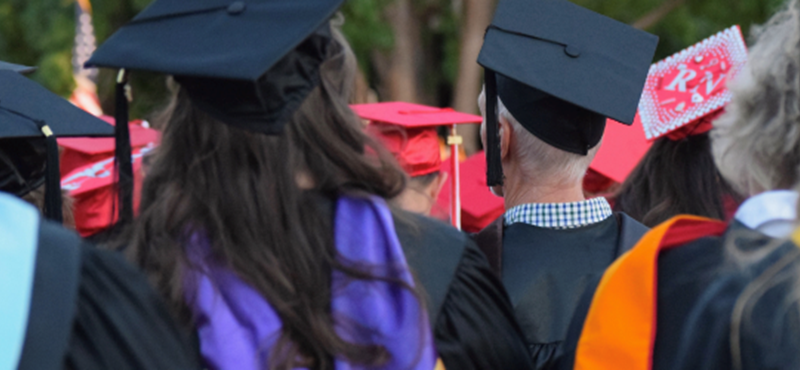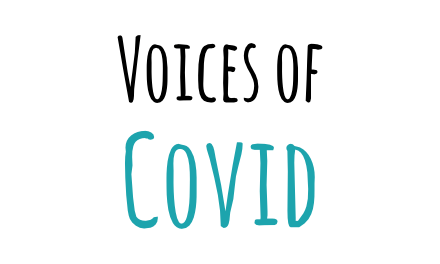Will Covid-19 make universities better for disabled students?

Like many students this year, Kayleigh is graduating from university in an unconventional way. She shares some of her experiences as a disabled student and how the Coronavirus pandemic has highlighted ableism in academia:
I was accepted into university at the age of seventeen and have always wondered, “Is it just because I’m disabled? Did they just accept me to tick a box?” A lot of disabled students experience a type of imposter syndrome in academia. I personally always felt that I was not as intelligent as my peers and did not deserve to be there. From this I was insistent in working harder, faster, and producing better work to prove to my tutors, peers and myself that I had the same worth. This constant feeling of having to go above and beyond was a lot of emotional labour that I have carried to the end of my degree.
After coming to university, I had a chat with supervisors and academic staff about my access requirements and other support needs. I told them that as someone with Cerebral Palsy, I often need to attend physiotherapy appointments, spasticity management clinics and other branches of support which are difficult to reschedule. On top of this and attending university, I had to work part time to make ends meet. When I inquired about accessing lectures and other materials online if I needed to miss a class, I was quickly shut down. Due to “confidentiality” and “privacy” issues, they could not record lectures, give out extra material or change the way they teach as it would not be fair on everyone else. They suggested if I was not able to keep up with face to face learning, I should consider dropping out or moving to a 100% online course.
Since the Covid-19 pandemic has started, all the requirements that I needed, but were told would be impossible to implement, are now mandatory for everyone. It is frustrating as it shows that these adaptions were possible, but some faculties would rather let disabled students drop out than spend money or time to adapt a course that includes everyone. The debate around lecture capturing has been discussed for a while, but only now that every student needs it, as opposed to a minority group, it is finally considered a good move.
I felt like we received very little support in our final semester as everyone had to adapt to these unprecedented circumstances. The remaining few lectures of the year were uploaded onto our shared worksite and any class notes were also available to download. However, accessibility still didn’t seem to be a priority as all videos or recorded material did not have subtitles and no images had descriptions. Trying to reach out for clarification would mean extra emotional and physical labour that sets us back in an already disrupted timeline of learning. As some university staff had been striking, I had not had face to face teaching or support since February 2020. I really do feel that disabled students were at a definite disadvantage when it came to completing this academic year.
At the time of writing, I have heard that some universities are moving all or the majority of classes online until such a time that it is safe to return to “normal.” Others are planning to open their doors in September in order to regain a sense of normalcy. Those that do plan on starting the 2020/2021 academic year face to face, are beginning to look at how they can make their universities safe and welcoming. I wonder what social distancing measures will look like for lectures, in canteens, social areas or with toilet facilities. Some disabled students already have to sit at the door or worse, in the halls outside because facilities are inaccessible! How are social distancing measures going to affect that? One-way systems, restricted use of lifts and blocking off certain areas of rest will be a nightmare for some disabled students who need to access certain places or rest during the day. If online, I also wonder if better accessibility will be provided, considering those with hearing impairments, visual impairments and more.
We shouldn’t go back to “normal.” That wasn’t working for disabled students. Our “normal” was pushing ourselves to be seen as equal, going above and beyond to prove ourselves, and dealing with explicit and implicit ableism every single day. Disabled people have been asking higher education institutions for reasonable adjustments for years. If universities are trying to figure out a new normal way of how to run things, I sincerely hope they include disabled people in the conversation.
Our weekly Voices of Covid series helps to draw attention to people's experiences in lockdown. The purpose is to raise awareness and shed some light on individuals’ stories of their situation in this challenging time. Do you have a story you would like us to share or an issue you would like to see discussed? Please get in touch to let us know.




 Follow Euan's Guide on Instagram
Follow Euan's Guide on Instagram
 Follow Euan's Guide on LinkedIn
Follow Euan's Guide on LinkedIn
 Follow Euan's Guide on Facebook
Follow Euan's Guide on Facebook


Comments
You have to be signed in to leave a comment.
Login / SignupADR
Hi Kayleigh, I found your article really interesting, thanks for sharing your experience. I do hope some of the online resources remain in place to improve accessibility, but I also hope that they make sure these resources are accessible for as many students as possible by adding alt text etc. as you have mentioned.
cathnichols
As a disabled p/t staff member it's been interesting to witness rows about 'lecture capture' being introduced to all lecture and seminar rooms across Leeds University campus. It happened several years ago for access reasons BUT it worries some staff as they felt attendance might fall leading to loss of motivation for some students and drop-out. Also, copyright: the uni now 'owns' our intellectual labour on developing teaching resources and could re-use them without us, effectively leading to staff lay-offs!... Also, despite reassurance that it won't be used for Big Brother reasons (monitoring staff) the union suggests it has been. Also, some staff with mental health issues find it even more anxiety-provoking. Their argument has been that disabled students have ALWAYS been allowed to record sessions for their own use via a digital recording device anyway. From my personal point of view the lecture capture system eases issues around attendance and students catching up missed work: we refer them to the recorded session (doesn't stop them still emailing and saying 'did you do anything I need to catch up on?' which is somewhat rude, after all we don't come in just to do nothing!). On the whole, though, I have found it OK and I know it is very useful for students with sickness absences or dyslexia who like to re-listen to work... also, for revision by more diligent students who question their notes. Current issues with online teaching brought in with the pandemic are internet connection and bandwidth issues in homes. I can been seen and heard in microsoft Teams (staff only) but only heard in Blackboard Collaborate (for staff-student interaction). This will be do-able for teaching but no good for students who may use lip-reading! I cannot continuously type what I am saying into the chat bar, and although there may be software dictation to convert speech to text it will be ropey (like TV sub-titles?)... Anyway, it is all a bit... uncertain. A staff member who has used it already said she noticed some very quiet students and one with autism really liked the online teaching and were far more interactive via the chat bar than they had been in class. But others had drifted. It's tricky. Teaching from home is good for my health. Two trains with a wheelchair and chronic pain is a terrible way to start and end a day! There will also be oodles of extra admin and training to go with it. I'm two minds about how long I can last teaching in academia because of he constant changes and new systems being brought in. As a side note: unis are not any better with access for their staff. They 'try' but some individuals are a nightmare to deal with, and room bookings don't listen. I had two teaching sessions last year (each 2 hrs long) and I asked that I have an hour's break between them for rest. Did I get this? No. In order to give me two accessible rooms, rather than book the same room for five hours, I was given one for 2 hrs, no break and another lovely fully accessible room (!) but it was at least ten minutes walk/wheels away. I didn't end up using them as I was signed off work sick for six months, after my health deteriorated.
starling14
Hi Kayleigh, totally agree with all you said, I've heard really bad things about accessibility in Scottish universities and I feel that it would definitely have been possible to accommodate you if they had wanted to. I know someone who had to choose her university based on the accessible facilities of the uni rather than the course itself. I've just finished doing my degree all online through The Open University and Student Support and my tutors were brilliant and could not have been more supportive. Also, maybe because you're all in the same boat in that the learning is online and it's the same for everyone, you don't really feel at a disadvantage. The face- to-face day schools etc. were also great and the tutors always made sure that I could participate, even if day-schools were sometimes too far away for me to attend. We also had online tutorials, student, and dept. forums etc. so you didn't feel isolated. I realise that this isn't the case for most unis and I'm really sorry that they weren't listening and supporting you; the tech and expertise was already out there and they should have valued your contribution equally and met your needs. It sounds as if they need to be educated by you, not the other way around!